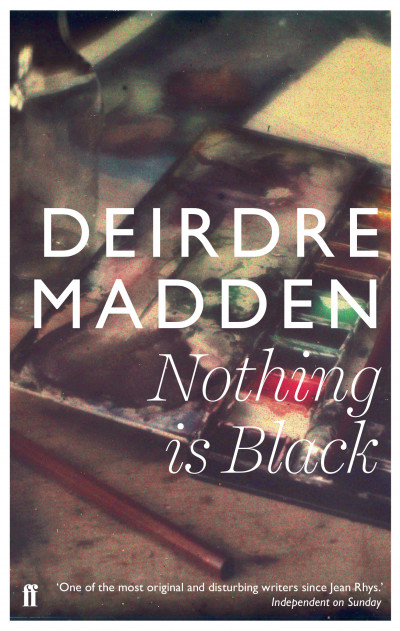
Nothing is Black by Deirdre Madden
When shopping in London a few months back, I went into Fopp for no other reason than the inexplicable desire to buy something. I was just in that kind of mood. In the book section, Deidre Madden’s Nothing is Black immediately caught my eye – firstly for its restrained cover design, an aesthetic I have always loved, and secondly for the reference to Jean Rhys in the review quote.
I love Jean Rhys. To say that Rhys was well ahead of her time is stating the obvious somewhat, but she was well ahead of her time. She created incredibly unique female characters in her novels, most of whom couldn’t or wouldn’t ascribe to the socially accepted behaviours or life choices for women at the time. Because of this, these characters were seen as tragic, and often encountered events that were damaging to their reputations. These events and the characters’ subsequent reactions would be forgiven – or at the very least understood – today, rendering Rhys’ stories all the more powerful to modern readers.
But this review isn’t about Jean Rhys; I just wanted to give a little insight into my expectations of a book and author I had never heard of before. I picked up Nothing is Black hoping to discover a story about misunderstood women suffering in silence in a world that punishes them for not confirming to gender norms. I was also hoping for a novel that was heavy on indicate characterisation and lighter on plot, as is the style of Jean Rhys.
For the most part, I got exactly what I wanted.
Nothing is Black follows Claire, an artist living alone in the depths of rural Donegal, as her life is interrupted by an impromptu visit from her Dublin-based cousin, Nuala. Claire, a ‘true loner’ who is dedicated to her daily routine of clifftop walks and painting, is rather put out by her city dwelling cousin’s visit – especially as it is to endure for the entirety of the summer.
Nuala is similarly put out at first; her husband has forced her to visit a relative she barely knows in order to recover from what he believes to be depression, an issue she is reluctant to discuss. Her mental health began to decline soon after her mother’s sudden death, which was closely followed by her daughter’s birth, and the scale of two such lifechanging events made her feel emotions she simply couldn’t understand or control. These emotions were first appeased by exorbitant shopping trips, but once those no longer satisfied her, she began to steal bizarre, inexpensive items such as cutlery from restaurants. After a fellow customer caught her cramming a teapot full of tea into her handbag at a cafe, shame forced her to reveal everything she had stolen to her husband. A few concerned visits to a doctor later, it is decided that she needs time by herself to grieve. What better place to do this than in the countryside with her cousin?
What ensues is a study into the bizarre, forced relationship of two very different women. They oddly begin to connect the more their stark differences are revealed, and as Madden jumps into different character’s points of view, we begin to note the similarities within the disparities, and vice versa. It’s a blunt, uncomfortable dissection of grief, selfishness, motherhood, love and the reality of relationships, as well as an uncompromising look at the inevitability of female unhappiness – often caused by the clash of personal and societal expectations.
I definitely understood the comparisons to Jean Rhys while reading Nothing is Black. Madden’s core focus is always on the subtle nuances of human nature rather than the creation of a tangible plot, and she unflinchingly hones in on the rarely talked about aspects of western society until everyday life begins to seem alien and wrong. In an almost callous way, she reveals the ridiculousness of social performance and the harm that it causes, particularly to women, but to men as well. On top of that, both Rhys and Madden use setting almost like another character, demonstrated wonderfully in Nothing is Black by the wild, unforgiving and unpredictable Irish countryside.
Nothing is Black illustrates how being both socially accepted and a social outcast can be lonely, painful and uncertain existences. It also shows how hard it is for women to verbalise their want for validation while simultaneously seeking independence and purpose in the modern age. The frustration of struggling with the inequalities of the past and the emerging equalities of the future is captured brilliantly, and Madden does so without giving the novel a falsely happy conclusion. That being said, it does end with a great sense of hope.
While Madden writes beautiful prose and dives into the heads of women in such an accurate and compelling way, I did find her characters difficult to enjoy at times, especially Claire. Nuala, who is materialistic and emotionally stunted (largely due to her relationship with her mother), acts annoying, pathetic and spoilt, but she also shows real growth and maturity by the end of the novel. Claire, on the other hand, is inexplicably sour and judgemental throughout. I couldn’t quite understand why she felt so superior to everyone else in her life, and as such I found her pretentious, cold and uninteresting. Rhys’ characters were always flawed but fascinating, and I couldn’t help but draw this unfavourable comparison to Madden.
That being said, I will definitely be looking into Deirdre Madden’s bibliography. Nothing is Black is as profound as it is entertaining, and it manages to be incredibly brave and bold while retaining the subtleties I’ve grown to love in Jean Rhys’ work.



Leave a Reply